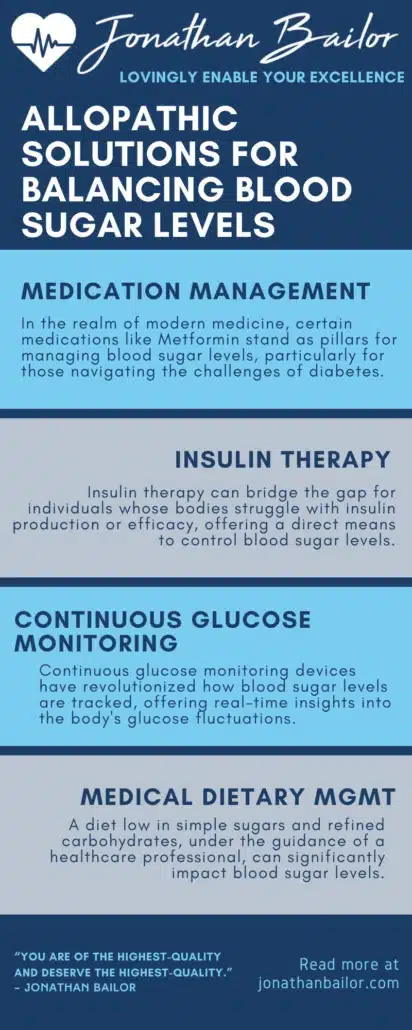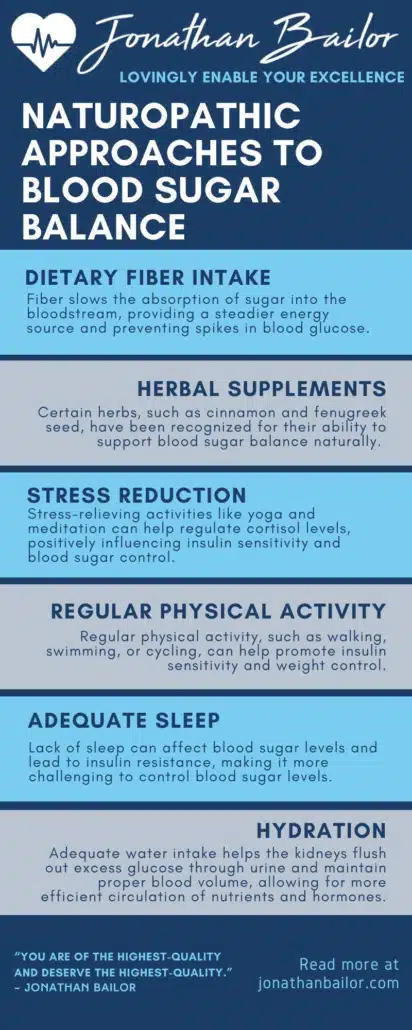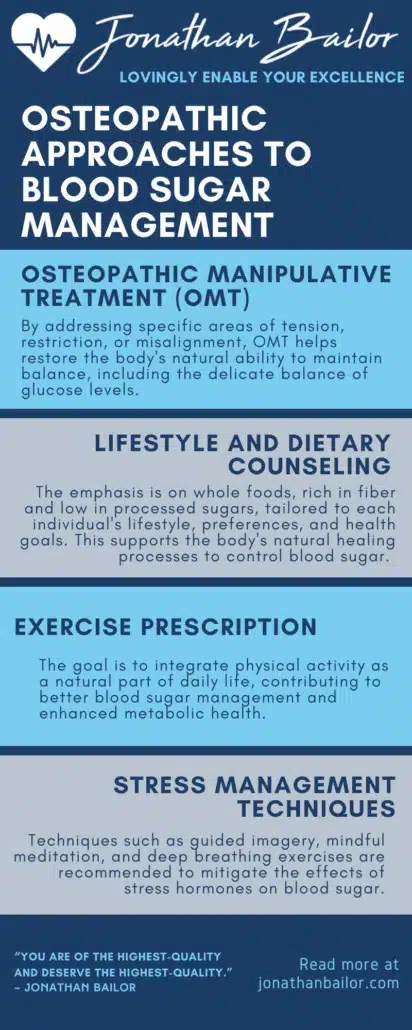19 Evidence-Based Treatments for Balancing Blood Sugar for Optimal Metabolic Health
In the pursuit of optimal health and wellness, maintaining balanced blood sugar levels is a fundamental aspect that cannot be ignored. It’s the unsung hero of a vibrant metabolism, influencing everything from energy levels to weight management. Yet, navigating the health information landscape can feel like deciphering an ancient map full of complex terms and conflicting advice. It’s time to clear the fog and focus on what truly matters: your health, well-being, and happiness.
Imagine embarking on a journey that leads to a treasure trove of well-being. This isn’t about quick fixes or fleeting trends. It’s about understanding the foundation of your body’s energy management system and harnessing it to fuel a life filled with vitality, clarity, and happiness. The secret lies in the power of blood sugar balance, a critical but often overlooked aspect of metabolic health.
Blood sugar levels are more than just numbers on a lab report; they’re indicators of your body’s internal rhythm, influencing how you feel from the moment you wake up to when you lay your head down to rest. When these levels are in harmony, you’re more likely to experience sustained energy, sharper mental focus, and overall well-being.
Conversely, when they’re off-kilter, it can feel like an emotional rollercoaster, with peaks of energy followed by sudden crashes, not to mention the long-term health implications.
This guide is a beacon of light for anyone who’s ever felt overwhelmed by the maze of health advice. It offers evidence-based treatments to balance blood sugar levels, each carefully selected for effectiveness and practicality. This isn’t about overhauling your life overnight but embracing small, manageable changes that collectively make a significant impact.
Whether you want to revitalize your energy levels, manage your body weight more effectively, or invest in your long-term health, these treatments are tailored to fit seamlessly into your life. They’re grounded in science but presented with warmth and simplicity, ensuring everyone can understand and apply them regardless of background.
Sharing this guide isn’t just about passing along information; it’s about nurturing a community of health and wellness where support and encouragement are abundant. It’s for anyone who believes in the power of informed choices and is ready to step towards a healthier, more vibrant life. So, whether you’re sharing this with a friend over coffee or with your family at dinner, know that it’s more than just advice—it’s a gift of health, a token of care, and a step towards a brighter, healthier future.
Let’s embark on this journey together, exploring the treasures of balanced blood sugar for optimal metabolic health. It’s time to unlock the door to a life brimming with energy and vitality.
Allopathic Solutions for Balancing Blood Sugar for Optimal Metabolic Health
In the quest for optimal metabolic health, the battle to balance blood sugar levels takes center stage. While the path to harmony within our bodies’ complex systems can seem daunting, the arsenal of modern medicine offers many strategies, each with its unique strengths. From the precision of medication management to the innovation of continuous monitoring technologies, allopathic (Western) medicine provides evidence-based solutions that cater to the individual needs of those seeking balance in their metabolic health.
These interventions, grounded in rigorous research and clinical practice, offer a beacon of hope and a testament to the advancements in healthcare. They serve not only as tools for managing blood sugar levels but also as pillars supporting a broader vision of health and well-being.
Here are four allopathic solutions that embody the confluence of science, technology, and personalized care in the journey toward optimal metabolic health.
1. Medication Management
In the realm of modern medicine, certain medications stand as pillars for managing blood sugar levels, particularly for those navigating the challenges of diabetes. Metformin, a first-line drug, enhances the body’s sensitivity to insulin, facilitating a smoother regulation of blood sugar without the risk of causing low blood sugar, a common side effect of other treatments.
Its effectiveness, coupled with a relatively low risk of side effects, makes it a cornerstone in diabetes management, illustrating the power of targeted therapy in harmonizing the body’s intricate dance of blood sugar control.
2. Insulin Therapy
Insulin therapy can bridge the gap for individuals whose bodies struggle with insulin production or efficacy, offering a direct means to control blood sugar levels. This treatment is tailored to mimic the body’s natural insulin release, adjusted for meal times and blood sugar readings, ensuring a personalized approach to management.
Medical innovation has played a crucial role in providing a lifeline to those in need, highlighting the significance of tailored care in the pursuit of metabolic health.
3. Continuous Glucose Monitoring (CGM)
Continuous glucose monitoring devices have revolutionized how blood sugar levels are tracked, offering real-time insights into the body’s glucose fluctuations. This technology empowers individuals to make informed decisions about diet, exercise, and medication, fostering a proactive approach to managing blood sugar levels.
By demystifying the body’s glucose dynamics, CGM devices illuminate the path to balanced blood sugar, highlighting the synergy between technology and health.
4. Dietary Management under Medical Supervision
While not a treatment in the traditional sense, medical supervision of dietary changes remains a cornerstone of allopathic care for blood sugar management. A diet low in simple sugars and refined carbohydrates, under the guidance of a healthcare professional, can significantly impact blood sugar levels.
This approach underscores the philosophy that food can be medicine, with the power to heal or harm, depending on its use. Through careful planning and professional oversight, dietary management becomes a key player in the ensemble of treatments for optimal metabolic health.

Feeling Better Is Priceless, That's Why We Don't Put A Price On It!
“It’s Like A Free and Medically Valid Version of Noom and Weight Watchers Online”
~ Dr. Doctor Matthew Oleshiak, MD
Click the 'LEARN MORE' button below for free lifetime access to the fast fix program developed by Jonathan and top Ivy League Medical Doctors
LEARN MOREP.S. It's not a free trial. It's not part of the program for free. The entire program is free, forever, for real! No credit card needed.
Naturopathic Approaches to Blood Sugar Balance for Metabolic Health
In a world where health and well-being are paramount, naturopathic solutions offer a harmonious blend of nature’s wisdom and holistic care. These strategies, deeply rooted in understanding the body’s natural healing capabilities, present a nurturing path to balancing blood sugar levels. It’s about turning to the earth’s bounty and our own lifestyle choices to foster metabolic health, a journey that aligns with the rhythms of nature and the innate power of our bodies to heal. Here, the focus is on prevention, education, and treating the whole person, not just the symptoms.
The following naturopathic solutions are like keys to unlocking a balanced and vibrant state of health, each offering a step towards synchronizing our inner workings with the natural world.
1. Dietary Fiber Intake
Elevating dietary fiber intake through a variety of whole foods, such as leafy greens, nuts, seeds, and legumes, can significantly impact blood sugar control. Fiber slows the absorption of sugar into the bloodstream, providing a steadier energy source and preventing spikes in blood glucose levels, which is why eating high-fiber foods is so important.
This approach not only supports metabolic health but also enhances digestive wellness, making it a cornerstone of a naturopathic diet.
2. Herbal Supplements
Certain herbs have been recognized for their ability to support blood sugar balance naturally. Cinnamon, for instance, is celebrated for its potential to improve insulin sensitivity and lower blood sugar levels. Fenugreek seeds, rich in soluble fiber, also contribute to improved glucose tolerance.
Incorporating these herbs into daily meals or taking them in supplement form can offer a gentle yet effective way to maintain healthy blood sugar levels.
3. Stress Reduction Techniques
Stress plays a significant role in blood sugar fluctuations. Naturopathic practices such as yoga, meditation, and deep-breathing exercises can mitigate stress and its effects on the body.
By fostering a state of relaxation, these practices help regulate cortisol levels, which can positively influence insulin sensitivity and blood sugar control.
4. Regular Physical Activity
Regular physical activity, such as walking, swimming, or cycling, can help promote insulin sensitivity and assist in maintaining a healthy weight in accordance with naturopathic principles.
Exercise acts as a natural insulin sensitizer, making it easier for the body to manage glucose levels. This lifestyle modification is a testament to the body’s ability to heal and maintain balance through movement.
5. Adequate Sleep
Prioritizing sleep is paramount in naturopathic care, with research underscoring its importance in blood sugar regulation. Lack of sleep can affect blood sugar levels and lead to insulin resistance, making it more challenging to control blood sugar levels.
Ensuring seven to nine hours of quality sleep a night supports hormonal balance and metabolic health, illustrating the interconnectedness of rest and wellness.
6. Hydration
Staying well-hydrated is a simple yet effective naturopathic strategy for supporting blood sugar balance. Adequate water intake helps the kidneys flush out excess glucose through urine and maintain proper blood volume, allowing for more efficient circulation of nutrients and hormones.
Incorporating herbal teas can also offer additional benefits, including hydration and the therapeutic properties of the herbs.
These naturopathic solutions provide a holistic approach to balancing blood sugar levels, emphasizing the power of natural remedies and lifestyle changes.
By embracing these practices, individuals can navigate towards optimal metabolic health, tapping into the body’s inherent wisdom and the nurturing support of the natural world.

Osteopathic Approaches to Blood Sugar Management for Enhanced Metabolic Health
In the harmonious world of osteopathic medicine, the focus on whole-body wellness provides a unique perspective on managing blood sugar levels. This approach, deeply rooted in the understanding of the body’s interconnected systems, offers gentle yet effective strategies that align with the natural flow of the body’s mechanisms.
Osteopathic treatments emphasize the importance of structural integrity, fluid motion, and the body’s innate capacity to heal itself. It’s a path that invites a deeper connection with one’s body, encouraging practices that promote balance and health from within.
The following osteopathic solutions are designed to integrate seamlessly into the rhythm of daily life, supporting the body’s efforts to maintain optimal blood sugar levels and overall metabolic health. They represent a commitment to nurturing the body’s natural equilibrium, offering a holistic approach to well-being that is both empowering and sustainable.
1. Osteopathic Manipulative Treatment (OMT)
OMT is a hands-on technique used by osteopathic physicians (DOs) to ensure the body’s musculoskeletal system is in optimal alignment, enhancing circulation and biomechanical efficiency. This technique can indirectly support metabolic functions, including blood sugar regulation, by improving the body’s ability to deliver nutrients and remove waste.
By addressing specific areas of tension, restriction, or misalignment, OMT helps restore the body’s natural ability to maintain balance, including the delicate balance of glucose levels.
2. Lifestyle and Dietary Counseling
Osteopathic physicians adopt a holistic approach to patient care, which includes personalized lifestyle and dietary counseling. This guidance focuses on adopting a balanced diet rich in nutrients that support metabolic health and encourage blood sugar stability. The emphasis is on whole foods, rich in fiber and low in processed sugars, tailored to each individual’s lifestyle, preferences, and health goals.
This counseling supports the body’s natural healing processes and promotes a sustainable approach to managing blood sugar levels.
3. Exercise Prescription
Consistent with the osteopathic philosophy of promoting overall well-being, DOs often prescribe specific exercises tailored to improve body composition, enhance insulin sensitivity, and encourage efficient glucose metabolism. These exercises are selected to suit the individual’s physical condition, preferences, and lifestyle, ensuring they are both enjoyable and beneficial.
The goal is to integrate physical activity as a natural part of daily life, contributing to better blood sugar management and enhanced metabolic health.
4. Stress Management Techniques
Recognizing the impact of stress on metabolic health, osteopathic medicine incorporates stress management techniques as a vital component of managing blood sugar levels. Techniques such as guided imagery, mindful meditation, and deep breathing exercises are recommended to mitigate the effects of stress hormones on blood sugar.
These practices encourage relaxation, helping to normalize cortisol levels and support the body’s natural regulatory systems, including those governing glucose metabolism.
These osteopathic solutions offer a path to blood sugar management that is in harmony with the body’s natural rhythms and healing capabilities.
By embracing these practices, individuals embark on a journey towards optimal health grounded in the principles of balance, wellness, and the holistic care of the whole person.

Eastern Medicine Approaches to Blood Sugar Balance for Metabolic Wellness
In the vast expanse of health and healing, Eastern and alternative medicine approaches offer a profound connection to the natural world and our inner selves. These time-honored practices provide a unique perspective on achieving and maintaining blood sugar balance, emphasizing the integration of mind, body, and spirit.
Through a lens that views health as a harmonious balance, these approaches invite us to explore healing practices that have nurtured well-being for centuries. With a focus on natural remedies, mindful movements, and energy balance, Eastern medicine opens the door to managing blood sugar levels in a way that is gentle, natural, and aligned with the rhythms of nature.
Below are key Eastern and alternative medicine solutions that weave together ancient wisdom and natural healing to support metabolic health, each offering a pathway to harmony and vitality.
1. Acupuncture
Acupuncture, a cornerstone of traditional Chinese medicine, involves the insertion of fine needles into specific points of the body to restore energy flow and balance. This practice is believed to influence the body’s natural insulin production and sensitivity, enhance the metabolic process, and aid in blood sugar regulation.
Through its calming effect on the nervous system, acupuncture also helps to reduce stress, a known contributor to blood sugar imbalances, showcasing the interconnectedness of emotional well-being and physical health.
2. Ayurvedic Dietary Adjustments
Ayurveda, the ancient Indian system of medicine, emphasizes the importance of a balanced diet tailored to one’s dosha (body type) for maintaining health. Incorporating Ayurvedic dietary principles, such as favoring whole, fresh foods and including bitter and astringent tastes, can support the body’s natural ability to regulate blood sugar.
Herbs like turmeric and fenugreek are often recommended for their insulin-sensitizing properties, illustrating Ayurveda’s approach to using food as medicine.
3. Tai Chi and Qi Gong
These gentle forms of exercise, deeply rooted in Chinese tradition, combine slow movements, deep breathing, and meditation to enhance the flow of Qi (vital energy) throughout the body. Practicing Tai Chi or Qi Gong can improve insulin sensitivity and promote a balanced state of mind, reducing stress levels that can adversely affect blood sugar.
These practices embody the principle that holistic movement and mindfulness can foster profound healing and metabolic balance.
4. Herbal Supplements
In the realm of alternative medicine, certain herbs and supplements are prized for their ability to support blood sugar management naturally. Berberine, for example, is known for its remarkable ability to lower blood glucose levels and improve insulin sensitivity. Similarly, bitter melon contains compounds that act like insulin, helping to reduce blood sugar levels.
These natural remedies offer a testament to the power of plants to support the body’s healing processes.
5. Meditation and Stress Management
Stress management through meditation and mindfulness practices is another vital component of Eastern medicine’s approach to balancing blood sugar. By reducing stress, these practices help to lower cortisol levels, which can positively impact insulin resistance and blood sugar control.
Meditation offers a sanctuary for the mind, a space where balance can be restored and wellness can flourish.
These Eastern and alternative medicine practices invite us to embrace a holistic approach to health, where natural remedies, mindful movement, and inner balance pave the way to metabolic wellness.
We journey toward a more balanced, healthy, and vibrant existence by integrating these ancient practices into our lives.

Hormone Health FAQS: Navigating the Path to Balance
In the intricate dance of well-being, hormones play a leading role, orchestrating the myriad functions that keep us feeling vibrant and alive. Yet, the topic of hormone health often seems shrouded in complexity, leaving many with questions about how to support this crucial aspect of their health best. Understanding hormones means unlocking the secrets to a balanced body and mind, where energy, mood, metabolism, and more harmonize to create a symphony of health.
Below are answers to frequently asked questions about hormone health, offering insights into how we can nurture and maintain this delicate balance through natural and supportive means.
Q1: What are the key hormones that affect my health?
Several key hormones significantly influence overall health, including insulin, which regulates blood sugar levels; thyroid hormones, which manage metabolism; cortisol, known as the stress hormone; sex hormones like estrogen, progesterone, and testosterone, which affect reproductive health and mood; and leptin and ghrelin, which control hunger and satiety.
Each plays a unique role in the body’s functioning, affecting everything from energy levels to weight management and emotional well-being.
Q2: How can I naturally balance my hormones?
Balancing hormones naturally involves a holistic approach to lifestyle and diet. Incorporating a variety of nutrient-dense foods, especially those rich in omega-3 fatty acids, fiber, and antioxidants, supports hormone health.
Regular physical activity, particularly strength training, and aerobic exercises can improve insulin sensitivity and hormone balance. Managing stress through practices such as yoga, meditation, or deep breathing exercises helps regulate cortisol levels. Ensuring adequate sleep and staying hydrated are also essential for maintaining hormonal equilibrium.
Q3: Can certain foods impact my hormone health?
Yes, certain foods can significantly impact hormone health. Foods high in refined sugars and processed ingredients can disrupt insulin levels and exacerbate hormonal imbalances. Conversely, foods rich in healthy fats, such as avocados, nuts, and seeds, support hormone production and balance. Cruciferous vegetables like broccoli and Brussels sprouts help in the detoxification of excess hormones, particularly estrogen.
Incorporating these foods into your diet supports hormonal health and overall well-being.
Q4: What signs indicate a hormonal imbalance?
Signs of hormonal imbalance can vary widely depending on which hormones are affected but commonly include unexplained weight gain or loss, persistent fatigue, difficulty sleeping, changes in appetite or digestive issues, irregular menstrual cycles or symptoms of menopause, decreased libido, mood swings, and problems with skin health such as acne.
If you experience these symptoms persistently, it may be indicative of a hormonal imbalance, and consulting with a healthcare provider for a comprehensive evaluation is advisable.
Q5: How does stress affect my hormone health?
Stress has a profound impact on hormone health, primarily through the production of cortisol. When stress is chronic, elevated cortisol levels can disrupt the balance of other hormones, including insulin, leading to increased blood sugar levels and weight gain. It can also affect reproductive hormones, causing irregular menstrual cycles or fertility issues.
Managing stress through mindfulness practices, adequate rest and recreational activities is crucial for maintaining hormonal balance and overall health.
By understanding the foundational role hormones play in our health and taking steps to support their balance through natural and mindful practices, we can enhance our well-being, vitality, and joy.
Nurturing hormone health is a journey of self-care that pays dividends in every aspect of life, empowering us to live fully and vibrantly.
Embracing Balance: A Journey Toward Holistic Health
As we navigate the intricate pathways to health and well-being, the insights from our exploration of balancing blood sugar through allopathic, naturopathic, osteopathic, and alternative or Eastern medicine practices shine like beacons of hope.
These diverse approaches, rich in wisdom and healing potential, invite us to embrace balance in our bodies and lives. As we share this journey with friends and family, let us extend an invitation to join us in this exploration, fostering a community of health and vitality.
Share this guide across social media platforms and via email, igniting conversations that inspire and empower. Let’s embark on this transformative path, embracing the harmony and health that await.
Feeling Better Is Priceless, That's Why We Don't Put A Price On It!
“It’s Like A Free and Medically Valid Version of Noom and Weight Watchers Online”
~ Dr. Doctor Matthew Oleshiak, MD
Click the 'LEARN MORE' button below for free lifetime access to the fast fix program developed by Jonathan and top Ivy League Medical Doctors
LEARN MOREP.S. It's not a free trial. It's not part of the program for free. The entire program is free, forever, for real! No credit card needed.




